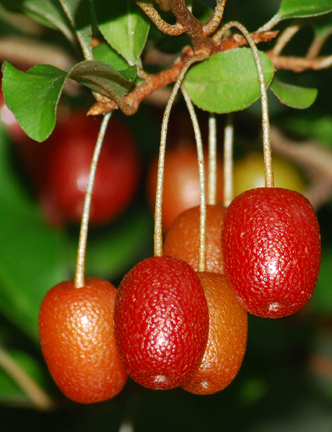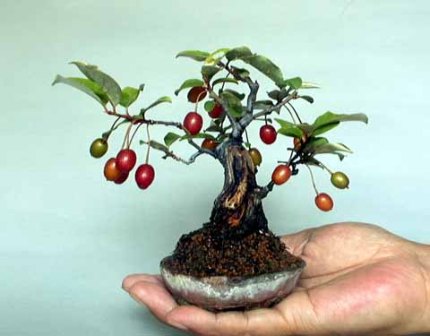
Goumi: Potential invasive?
 When I wrote about eating Autumn
Olive fruits,
I started to tell you that rather than planting the invasive (though
useful) shrubs, you should install their kissing cousin Goumi in your
garden. Goumi made it onto my must-have list this
spring when two Asheville
forest gardeners
both listed the fruit in their top four alongside more well known
perennials like pears and blackberries.
When I wrote about eating Autumn
Olive fruits,
I started to tell you that rather than planting the invasive (though
useful) shrubs, you should install their kissing cousin Goumi in your
garden. Goumi made it onto my must-have list this
spring when two Asheville
forest gardeners
both listed the fruit in their top four alongside more well known
perennials like pears and blackberries.
In addition to producing
delicious berries, both Autumn Olives and Goumis
are among the few non-legumes that are nitrogen-fixers, so the bushes
can
grow in very poor soil. And I had read that Goumis aren't
invasive.
However, a more
extensive search of the internet puts that last
assertion in doubt. Yes, the USDA doesn't list Goumi as invasive
at
the moment, but the species has been seen growing in the wild in twelve states
 and is listed as a potential
invasive by Alabama and Tennessee. I wouldn't be at all
surprised if Goumi spreads far enough to be a federally listed invasive
species in a few years.
and is listed as a potential
invasive by Alabama and Tennessee. I wouldn't be at all
surprised if Goumi spreads far enough to be a federally listed invasive
species in a few years.
Despite the enticing
nature of Goumi bushes, I think I'm going to resist the urge to plant
them in my garden. I guess that if I was really itching to try
the fruit without putting my woods at risk, I could always make a Goumi
bonsai like this one....
Want more in-depth information? Browse through our books.
Or explore more posts by date or by subject.
About us: Anna Hess and Mark Hamilton spent over a decade living self-sufficiently in the mountains of Virginia before moving north to start over from scratch in the foothills of Ohio. They've experimented with permaculture, no-till gardening, trailersteading, home-based microbusinesses and much more, writing about their adventures in both blogs and books.
Want to be notified when new comments are posted on this page? Click on the RSS button after you add a comment to subscribe to the comment feed, or simply check the box beside "email replies to me" while writing your comment.

I haven't seen any wild goumi growing here in Japan, but then again, I haven't looked. They are a common garden plant here though. They are pretty astringent, but make a nice drink when soaked in vodka for a year.
Interesting that you haven't seen it in the wild since it's supposed to be native to Japan (as well as China and Korea.) Of course, native plants tend to have a lot of diseases and predators holding them back, so it would be less common in its native land than as an invasive somewhere else.
Steeping in vodka for a year sounds pretty hard core...
Anna,
I'd second Eric's comments. Gumi are very popular here in Japan (and we've deliberately planted at least one in every garden we've had... my wife loves the berries). It isn't a plant that I would ever have thought of as invasive. The berries have a single, large (interestingly shaped) seed, so even re-seeding by birds wouldn't seem to be much of a problem. It has very attractive foliage, making it an ideal decorative shrub as well as a food (or drink source.
I'd definitely recommend the Gumi as a garden shrub (it's about as invasive as an apple in our 20+ years experience of growing it).
source.
I'd definitely recommend the Gumi as a garden shrub (it's about as invasive as an apple in our 20+ years experience of growing it).
So, what we must do is tetraploidize (if that's applicable to goumi karyotype) it, backcross to the diploid, and grow out the non-seedbearing triploid. Just as has been done with banana and some other fruit. If it works, then have vegetatively propagable sterile plants. Should have been done with Elaeagnus -- a little late now! P.S. I'm going to do just that. Does anyone know how thick the testa is?
could you please let me know if those plants are deer tolerant:
1) Aronia melanocarpa, black chokeberry 2) Viburnum nudum, nannyberry 3) Viburnum lentago, nannyberry 4) Elaeagnus multiflora, goumi 5) Ribes hybrid, jostaberry 6) Viburnum cassionoides, witherod viburnum
Thank you
Contrary to what someone said in this comment thread about the fruits of Elaeagnus not being all that attractive to birds, the exact opposite is true. The main way plants of this genus spread is through distribution of seeds by birds who eat the fruits and carry the seeds to wherever they fly and, in effect, plant them when they eliminate waste.
I do think one could grow goumi for fruit without posing the threat of spreading it by planting it in a large container or containers, and making sure to keep track of seasonal changes such that you can put a net over it when it's about ready to fruit. As I have a big mess of invasive exotic Elaeagnus pungens in my yard planted by a former homeowner, I'm pretty familiar with its annual cycle and I think you could get a smaller plant — as opposed to my giant overgrown hedge consisting of five plants far taller than me, which climb up into the live oaks — covered with bird netting like people use for blueberries in time to prevent avian spread of this invasive exotic plant's seeds. And being diligent about that would mean more fruit for you!